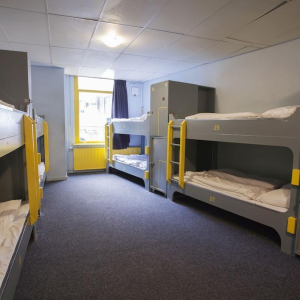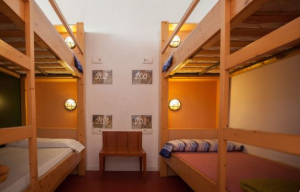This is Hostel
A hostel is a type of accommodation facility or service that provides affordable accommodation, especially for individual travelers, students, and low-budget travelers. Dormitories, usually called dormitories, are equipped with common areas such as shared bathrooms and toilets. Hostels provide the opportunity to get to know different cultures and meet new people by offering an accommodation experience in a young and social atmosphere. At the same time, it is an economical option for those who want to travel at a low cost and helps them use their travel budget more efficiently. Nowadays, hostels are found in many countries and tourist areas and are a popular accommodation choice among travelers.
History of the hostels in
The history of hostels is an interesting one, shaped in parallel with the development of the accommodation sector. The origin of hostels dates back to the Middle Ages in Europe, when the roads were not safe and travelers needed shelter. During this period, institutions such as monasteries, hospitals, and inns provided shelter for poor or weary travelers. In the 19th century, with the industrial revolution and the spread of the railway network, traveling became easier and cheaper. In the 20th century, with the Industrial Revolution and the spread of the railway network, travel became easier and cheaper. This has created a passion for travel, especially among young people, who want to get to know different cultures and have new experiences. However, there are still no suitable accommodation options to satisfy this travel passion. Therefore, some entrepreneurs and idealists have started to establish hostels in order to offer an affordable, clean and safe environment to young travelers.
The first examples of hostels are the Youth Hostel, opened in 1909 by Richard Schirrmann in Germany, and the Swiss Association of Youth Hostels, founded in 1912 by Walter Mittelholzer in Switzerland. These hostels were used by schools or military barracks that operated only in the summer. Later, the number and quality of hostels increased, creating an international network. Today, there are about 50,000 hostels around the world.
Differences between Hostel and Hotel
The differences between a hostel and a hotel are:
- The price: Hostels are usually more affordable than hotels. It is preferred as an economical option for low-budget travelers, students and backpackers. Hotel accommodation, on the other hand, is usually more expensive and prices may vary depending on the level of comfort and services.
- Room type Hostels often have shared bedrooms. In these rooms, guests can stay in the same room as other strangers. Some hostels also have private rooms. In a hotel, there are usually options that offer more privacy and comfort, such as private bedrooms or suites.
- Common areas Hostels emphasize common areas in order to encourage social interaction. Through shared kitchens, seating areas, and social activities, guests can meet and interact with each other. In a hotel, there are fewer common areas and more private areas.
- Services provided: Hotel accommodations usually have a wider range of services. The hotel can offer many services such as 24-hour reception, restaurant, room service, laundry, gym. Hostels, on the other hand, may offer basic services, such as a shared kitchen, free Wi-Fi, and in some private hostels, tour arrangements and social events.
- Location: Hotels are usually located in tourist areas, city centers, or business districts. Hostels, on the other hand, are usually located in more economical areas or around tourist areas, although they are close to central areas.
- The target audience: Hostels are usually preferred for young travelers, backpackers, students, and low-budget travelers. The hotel, on the other hand, caters to a wider range of customers and meets a variety of budget and comfort requirements. In general, the main differences between hostels and hotels are over price, room type, common areas, services, location, and target audience. By choosing the one that suits your travel plans and budget, you can plan your accommodation and have an unforgettable travel experience.
What are the advantages of hostels?
The advantages of Hostels are:
- Economical accommodation: Hostels are usually more affordable than other accommodation options. Especially for low-budget travelers, it is an ideal option in terms of reducing costs.
- My social environment: Hostels offer accommodation in a youthful and social atmosphere. The gathering of travelers from different countries and cultures offers the opportunity to meet new people and make friends.
- Exchange of information: Hostels allow you to exchange information about travel experiences and tips. Information from other travelers and local guides can make your trip more enjoyable and productive.
- Central locations: Many hostels are located near city centers or tourist areas. This makes it easier for you to explore the city and gives you an advantage in transportation.
- Various possibilities: In addition to your basic accommodation needs, hostels can also offer facilities such as shared kitchens, free Wi-Fi, and laundry facilities. In addition, some hostels offer extra experiences to guests by organizing events, tours and social activities.
- Flexibility: Many hostels have a variety of room types and options. Different accommodation options are offered, from shared dormitories to private rooms, providing flexibility to suit travelers' preferences.
What Are the Disadvantages of Staying in Hostels?
The answer to this question may vary depending on your personal preferences and expectations. However, in general, we can say that there are some negative aspects of staying in hostels. Here are some of them:
- Hostels are usually very noisy. Especially in common areas or dormitories, the conversations of other guests, music, phones, or alarm clocks can disturb you. If you want to sleep in a quiet and peaceful environment, hostels may not be right for you.
- Hygiene standards may be low in hostels. Since it is cheaper than hotels, the cleaning services may also be of lower quality. You may have problems with the use of shared bathrooms and toilets, the frequency with which sheets are changed, and the provision of personal care items such as towels and soap. If you are sensitive about hygiene, hostels may not be suitable for you.
- Hostels can have security problems, and it can be difficult to find a safe place to store your belongings. Although locked lockers or safe deposit boxes can be found in some hostels, these may not always be sufficient or reliable. Also, staying in the same room with strangers can be risky for your personal safety. If you are worried about the safety of your belongings or yourself, hostels may not be suitable for you.
Recommendations for those staying at Hostel
- Keep Your Valuables Safe: Security is always important in a hostel environment. You can use personal lockers to protect your valuables, or you can take your valuables with you.
- Order and Cleaning in the Bedroom: If you're staying in shared bedrooms, make sure they're tidy and clean. Being organized in common areas allows you to live in harmony with other guests.
- Bring earplugs and eye patches: Bedrooms can be crowded and noisy sometimes. Simple accessories, such as earplugs and eye patches, can be helpful for a more comfortable sleep.
- Light luggage and travel lock: When traveling, opt for a light and portable suitcase. Also, using a travel lock will help keep your valuables safe.
- Use the shared kitchens: Hostels usually have shared kitchens. Using these areas, you can make your own food and save on your travel budget.
- Participate in social activities: Hostels organize social events and offer the opportunity to meet other travelers. You can join in and take this opportunity to make new friends.
- Ask for local advice: Ask the hostel staff or other guests about local recommendations and places to visit. Local tips can make your trip more enjoyable and unforgettable.
- Be careful: Be careful when interacting with other guests in the hostel environment. Avoid sharing your personal information and follow basic security rules.
- Light Snacks and Water: You may get hungry or thirsty while traveling. You can meet your needs by carrying a few snacks and a bottle of water.
- Follow the hostel rules: Each hostel may have its own rules. Following rules such as check-in and check-out hours and quiet hours is important to ensure the comfort of both you and the other guests. While staying at the hostel, it is a great opportunity to interact with other guests and meet new cultures and people. To make the most of this experience, you can have an unforgettable trip by making proper preparations and observing basic safety precautions.

